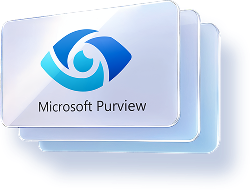Home Technology Microsoft Purview Consulting Service
Microsoft Purview Consulting & Implementation Services
Kanerika delivers enterprise data governance, security, and compliance solutions powered by Microsoft Purview. Our experts help you discover, classify, protect, and govern sensitive data across multicloud, on-premises, and SaaS environments while maintaining regulatory compliance and reducing data risk.

Watch Kanerika Transform Data Governance with Microsoft Purview
Measurable Impact with Kanerika's Purview Solutions
60%
reduction in data security incidents
70%
reduction in manual classification efforts
90%
faster incident response time
80%
Quicker compliance reporting cycles
65%
improvement in data discovery efficiency
Advanced Microsoft Purview Services for Enterprise Data Protection
Kanerika delivers end-to-end Microsoft Purview services with KANGovern, KANGuard, and KANComply to secure data, ensure compliance, and enable trusted analytics and AI.
Information Protection & Classification
- Discover and classify sensitive data across your entire estate
- Apply encryption, access controls, and sensitivity labels automatically
- Deploy classification policies aligned with regulatory requirements
Data Loss Prevention (DLP)
- Prevent unauthorized sharing across endpoints and cloud services
- Monitor and block risky data transfers in real-time
- Configure adaptive protection rules based on user behavior

Unified Data Catalog
- Build comprehensive catalogs across Azure, AWS, and on premises
- Enable data discovery through natural language search
- Map data lineage from source to consumption
Data Quality & Stewardship
- Assess quality across completeness, accuracy, and consistency
- Assign data stewards with clear accountability frameworks
- Track quality metrics and certification with dashboards

Compliance Manager & Assessments
- Assess posture against GDPR, HIPAA, SOC 2, and ISO
- Access 360+ pre-built assessments with step-by-step guidance
- Track compliance scores and generate audit-ready reports
eDiscovery & Records Management
- Search and collect data across mailboxes, SharePoint, and Teams
- Place legal holds to prevent deletion or modification
- Apply retention policies to preserve business-critical data

Copilot Data Security
- Protect data accessed by Microsoft Copilot and AI applications
- Apply data boundaries and access controls for AI tools
- Monitor AI interactions with sensitive information through logs
Privacy Risk Management
- Manage subject rights requests for GDPR and CCPA regulations
- Automate personal data discovery across Microsoft 365 and Azure
- Orchestrate consent management and data deletion workflows

Kanerika's Custom Data Governance Solutions

Enterprise-grade frameworks that transform fragmented data into trusted, compliant, and actionable assets across your entire organization.
KANGovern: Intelligent Data Governance Framework
Auto discovery and classification across multicloud and hybrid data estates.
Business terms and catalogs that support self-service data access.
Strong visibility and quality checks for better decision making and data trust.
KANGuard: Advanced Data Protection Layer
Smart protection based on user actions, device type, and location signals.
Zero trust controls with fast threat response for cloud and enterprise data.
Smooth link with SIEM tools for clearer security insights and unified operations.
KANComply: Automated Compliance Management
Support for GDPR, HIPAA, PCI-DSS, SOC 2, ISO and other major standards.
Automated control checks and risk-based tasks to reduce manual work.
Simple dashboards that show compliance scores and audit readiness.
Why Enterprises Choose Kanerika for Microsoft Purview

Certified Microsoft Partner
Recognized Data and AI solutions partner with strong experience deploying Microsoft Purview for governance.

Compliance and Risk Expertise
Team maps regulatory needs to Purview policies and designs audit-ready controls.

Proven ROI and Faster Time-to-Value
Efficient Purview deployment that reduces cost, speeds rollout, and improves measurable compliance outcomes.

Full Purview Lifecycle Support
Assessment, setup, rollout, automation, and managed services for complete Purview adoption.

Industry Experience with Purview
Purview deployed across healthcare, finance, retail, manufacturing, and public sector clients.

Strong Delivery History
Early Purview specialist with many successful projects improving data safety and compliance readiness.
MIGRATION SOLUTIONS
How Enterprises Level-Up Analytics with Kanerika and Microsoft Fabric
Mastering Data Governance with Microsoft Purview Implementation
Impact:
- 57% Reduction in Data Discovery Time
- 90% Increase in Compliance Adherence
- 70% Enhancement in Data Accessibility
Transforming Data Governance for a Leading Bank with Microsoft Purview
Impact:
- 0% Data Breaches
- 100% Adherence to Compliance Regulations
- 15% Increase in Loyal Customers
Getting Started with Microsoft Purview
Step 1
Data Governance Assessment
Talk to our experts about your data challenges. We’ll assess your current setup and identify opportunities.

Step 2
Pilot Implementation
Deploy Purview for a specific use case or business unit. Demonstrate value through improved data discovery, classification accuracy, or compliance reporting.

Step 3
Enterprise Rollout
Scale proven solutions across your organization. Our phased approach ensures minimal disruption while maximizing adoption and ROI.

Get Started Today
Boost Your Digital Transformation With Our Expert Guidance

Thanks for your interest!
We will get in touch with you shortly
Let’s connect!
Frequently Asked Questions (FAQs)
01What is Microsoft Purview and how does it support data governance?
Microsoft Purview is a unified data security, governance, and compliance platform that helps organizations discover, classify, protect, and manage data across multicloud, on-premises, and SaaS environments through integrated tools for data cataloging, protection policies, and regulatory compliance.
02How does Kanerika help organizations implement Microsoft Purview?
Kanerika provides end-to-end Purview services including assessment, architecture design, implementation, migration from legacy systems, policy configuration, user training, and managed services. Our custom solutions—KANGovern, KANGuard, and KANComply—accelerate deployment and maximize value realization.
03What industries benefit most from Microsoft Purview implementation?
Healthcare, financial services, government, retail, manufacturing, and professional services benefit significantly due to strict regulatory requirements like HIPAA, GDPR, PCI-DSS, SOC 2, and industry-specific data protection standards requiring comprehensive governance.
04How long does a typical Microsoft Purview implementation take?
Implementation timelines vary by scope: basic deployments take 6-8 weeks, mid-sized implementations require 10-14 weeks, and comprehensive enterprise rollouts span 16-24 weeks. Kanerika’s accelerators reduce standard timelines by 30-40%.
05What is the difference between Microsoft Purview and Microsoft Prvia?
Microsoft Purview focuses on data security, governance, and compliance across the entire data estate. Microsoft Priva specifically addresses privacy management including subject rights requests, consent management, and personal data handling for privacy regulations like GDPR.
06Can Microsoft Purview work with non-Microsoft cloud platforms?
Yes, Purview integrates with Azure, AWS, Google Cloud, Oracle Cloud, and on-premises environments. It can scan, classify, and govern data across multicloud architectures while providing unified visibility and control through a single platform.
07What data sources can Microsoft Purview scan and classify?
Purview supports 200+ data source types including Azure services, SQL databases, Oracle, SAP, Snowflake, Databricks, Amazon S3, Google Cloud Storage, file shares, SharePoint, OneDrive, Power BI, and custom applications through API connectors.
08How does Microsoft Purview handle sensitive data classification?
Purview uses machine learning and pattern matching to automatically identify 200+ sensitive information types including PII, financial data, health records, and intellectual property. Organizations can create custom classifiers and train models for industry-specific data.
09 How does Kanerika's assessment process work?
Our 2-week assessment includes data landscape analysis, current security posture review, compliance gap identification, user interviews, system inventory, risk assessment, and deliverables including findings report, architecture recommendations, implementation roadmap, and ROI projections.
10What is included in Kanerika's KANGovern framework?
KANGovern includes automated data discovery workflows, business glossary templates, pre-configured classification taxonomies, compliance mapping to major regulations, role-based access templates, policy libraries, integration patterns for common data sources, and monitoring dashboards for governance KPIs.